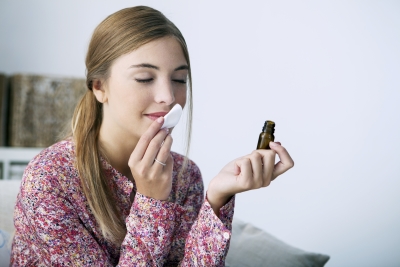
Using smell to boost learning during sleep
A recent study has examined the role of odour in memory and learning, and has confirmed that the use of aromas while learning and sleeping may improve exam performance.
To summarise, the study concludes that if we smell an aroma while we learn new information and then sleep next to a source of the same aroma, we will find it easier to recall the information later.
While this has been identified in previous studies, this particular paper is unique in that it describes the effect in a real-life situation. The researchers published their findings in the journal Scientific Reports.
As the lead author, Dr. Jürgen Kornmeier, explains, “We showed that the supportive effect of fragrances works very reliably in everyday life and can be used in a targeted way.”
Taming memory
Information is constantly provided to us during our day by our five senses, and the brain then picks out relevant information in order to build a picture of what is happening around us.
Some of this sensory information moves into our short-term memory, with an even smaller proportion of that moving into our long-term memory, allowing us to recall it at a later date.
The process of learning new information relies on the details moving from short-term memory into long-term memory – this happens through a process called consolidation. Previous studies have shown that consolidation that takes place during sleep is vital in creating memories. Scientists have been interested in how to influence and enhance consolidation, and therefore, some have looked at odour.
Smell and memory
Olfaction is one of the oldest senses, and is closely linked to parts of the brain that deal with emotion and memory – this explains why some smells can easily transport us back to a specific point in time.
For a number of years, scientists have been investigating to see whether the ties between olfaction and memory could be used to enhance learning abilities.
For instance, in a 2017 study, researchers presented some participants with an odour while they completed a learning task. The same odour was then presented to the rest of the participants while asleep. The participants who smelled the odour during slow wave sleep performed better on memory tests than the participants who smelled it during rapid eye movement (REM) sleep. The participants who had been initially presented with the odour performed better than the participants who had not.
Although the idea of using an odour to aid memory is simple, some other studies have shown that the researchers must present the odour during slow wave sleep for it to work. In order to do this, the individual must be tracked as they sleep using hi-tech equipment, therefore making this technique of very little use to the general public.
In this new study, the scientists aimed to find out whether this technique could be successful in a real world setting.
The smell of a rose
In order to investigate this, the scientists recruited 54 students from sixth grade classes in Germany. The students were asked to keep rose scented sticks beside them while studying English vocabulary at home. One week after the vocabulary was first encountered during a school class, the students sat an exam.
Half of the students were split into four experimental groups:
Group 1: No exposure to any odour cues.
Group 2: Exposure to rose scent while learning at home and during the vocabulary test.
Group 3: Exposure to rose scent while learning at home and during each night before the test but not during the test.
Group 4: Exposure to rose scent while learning at home, every night before the test, and during the test.
The remaining students did not receive any odour cues at any time, and therefore acted as controls.
Groups 3 and 4 performed significantly better during the exam than groups 1 and 2. Group 2 did not benefit. Therefore, this demonstrates the importance of aroma exposure during sleep.
“The students showed a significant increase in learning success by about 30% if the incense sticks were used during both the learning and sleeping phases,” said first author Franziska Neumann.
Group 4 performed slightly better than group 3; however, the difference was not statistically significant, reaffirming the theory that exposure to the odour during sleep is the pivotal factor.
Real-world applications
One of the most significant findings of the study was that the aroma boosted memory performance while present for the full night – this means that there was no need to present the smell specifically during slow wave sleep.
As Dr. Kornmeier says, “This makes the findings suitable for everyday use.”
A study involving only 54 participants is not large enough to be definitive. However, the effect has been well researched, and so there is little doubt that pairing odours with memory tasks may prove useful to some people.
The results demonstrate that this technique could be used by people in real-life situations, and is easy to do.
There are various limitations to the study due to its real-life setting. The scientists had to rely on the participants using the rose scent correctly at home, and they also had no control over the proximity of the rose scented sticks, meaning each participant may have experienced varying intensities of the aroma.
Regardless, the results of this study add to the evidence that pairing learning and sleep with aromas can boost memory performance.
Tags: learning, olfactory, smell



Great content! Super high-quality! Keep it up! 🙂